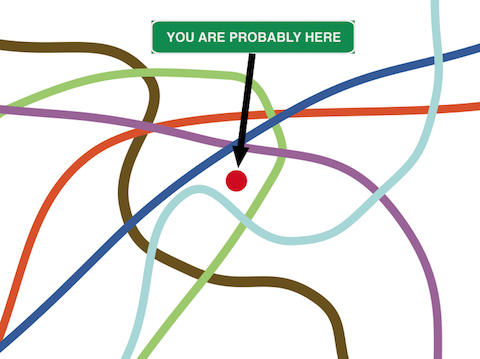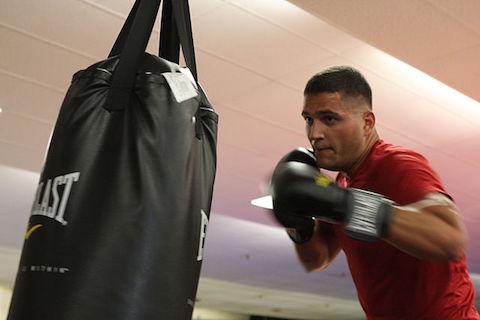
Can you really know what skills you’ll need? Not exactly, but you can do better than guess.
One of the more interesting comments I get in the defensive training world is that “you don’t know what the attack will look like, so you have to be prepared for anything.” It’s not entirely true and thus is dangerously distracting in its conclusion.
I’ve talked about the fallacy of being prepared for everything before, so rather than repeat myself I’ll just encourage you to read the article. In short, it’s not possible to prepare for everything; you need to make some decisions about how you’ll use your scarce resources and what you’re going to prepare for.
It’s the first part of the statement that I want to tackle today: the notion that no one can possibly know what they’ll be facing with certainty.
I’ll concede that we can’t be absolutely certain what we’ll face if and when we’re attacked. In reality, nothing in life is certain – you can’t be certain, for instance, that you’ll even wake up tomorrow. You can’t be certain that your toaster will work. You can’t be certain that your car won’t die on the freeway on the way to work. You can’t be certain you’ll have a job when you get to your desk. In fact, you can’t even be certain that the sun will come up tomorrow.
You can’t be certain of any of those things — nor, in fact, of anything in your world. As Werner Heisenberg famously pointed out, we live in a world that’s governed by probability; nothing is clear-cut, even in molecular science, and the best we can hope to do is to come up with probabilities for what will happen.
In our world, probability rules what happens to you in a defensive context as well. It’s true that we can’t be certain how, when or where you’ll be faced with a lethal attack, but we can make some educated guesses based on things like past attacks on others, crime rates and trends in specific areas, and even your vulnerabilities. In fact, in order to apportion your limited training and preparation resources you absolutely must think about the probabilities.
In my classes I often use the example of North Korean paratroopers swooping in and taking us all hostage to illustrate the idea of plausibility. Of course it’s possible that could happen, in the sense that the laws of physics don’t prevent it, and thus we can’t be certain it won’t happen. What we can say, without fear of contradiction, is that the probability of that happening is so remote that it’s left to Hollywood to make it come true. Compare that to the probability someone will cut you off in traffic on your drive to work tomorrow; how many orders of magnitude more likely is a road rage incident?
Everything you do in life, and therefore everything you do in preparation to preserve your life, is a probability — not a certainty. Asking anyone if they can know “for certain” what some future event will be is meaningless, particularly when there are better questions you can ask.
No, you can’t know for certain that you won’t need a specific skill or a specific technique. But you can study how crime happens, how attackers pick their victims, how burglars case houses, and other aspects of personal protection. That knowledge allows you to determine the probabilities of what you’ll need to do to prevent or mitigate those crimes.
You might be thinking “why carry a gun at all, then? The probability of needing it is slim. Aren’t you talking out of both sides of your mouth?”
Now that’s a good question. When you come down to it, you’re far more likely to need training in trauma care than in defensive shooting; and it’s quite likely that knowing how to communicate with people and defuse explosive situations will be more likely to keep you out of trouble than your concealed pistol. I recommend that you develop those skills, too (given the number of, shall we say, abrasive people I’ve met in the training world I would suggest that there is a distinct need for some training in conflict resolution!)
In fact, I’ve actually told students that I would have preferred they’d gotten emergency medical training before spending their money on my class. Why? Massive trauma happens every day, far more often than criminal attacks, and it is immediately life threatening. Knowing how to handle a medical emergency is probably more valuable to everyone than taking yet another shooting class. (It’s that kind of brutally honest statement that will keep me from making a fortune in the training business!)
Still, you can look at the number of violent crimes in this country (and, as I’ve pointed out recently on social media, state and even local crime rates) and discover what the probabilities are. When you factor in the consequence of one of those attacks happening (death or grave bodily harm, either to you or someone else), carrying a defensive tool — of which the legally carried firearm is one of the most efficient — is clearly a rational action.
You can’t be sure of anything. You can, however, get a reasonable approximation of surety by understanding that life, and everything that happens in it, is governed by probabilities. Use that to your advantage by understanding what the odds are in your life and preparing intelligently for them.
As my Dad once said, “the fastest horse doesn’t always win the race — but that’s sure the way to bet!”
-=[ Grant Cunningham ]=-
- Posted by Grant Cunningham
- On March 6, 2015


